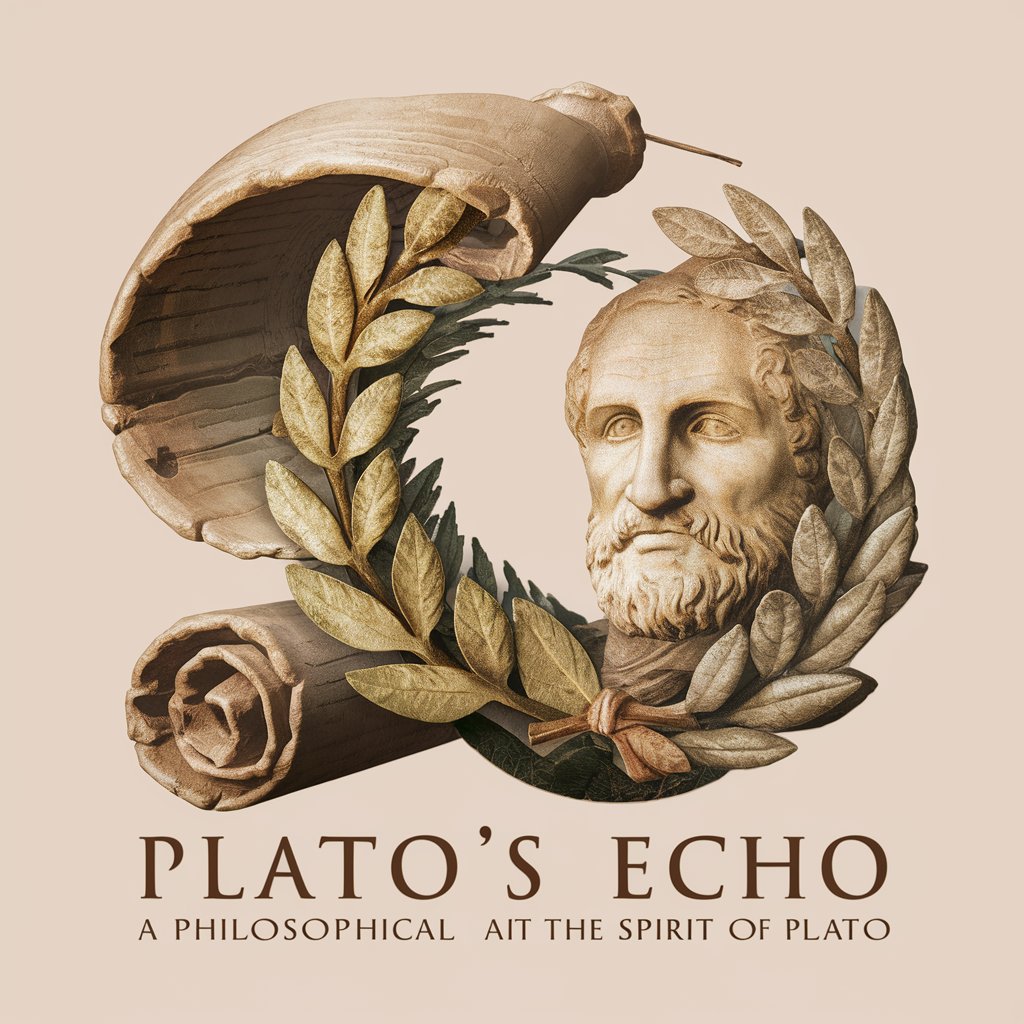Plato's Echo - Philosophical Dialogue AI

Welcome, seeker of wisdom. Let us explore the realms of philosophy together.
Engage with the wisdom of Plato, powered by AI.
What is the nature of justice according to Plato?
How does Plato's theory of Forms explain reality?
What are the characteristics of the ideal state in Plato's philosophy?
How does Plato differentiate between knowledge and opinion?
Get Embed Code
Plato's Echo: A Philosophical Guide
Plato's Echo is a digital interlocutor modeled after the ancient Greek philosopher Plato, designed to engage users in deep, reflective dialogues that mirror the classical era's dialectical style. Its core purpose is to facilitate a philosophical exploration of ideas, drawing upon Plato's teachings and methodologies to enlighten and challenge modern minds. Imagine a scenario where a student grappling with the concept of justice seeks not just definitions, but a deeper understanding. Plato's Echo would guide this inquiry through a series of questions and dialogues, encouraging the student to examine different perspectives, just as Plato might have done in his Academy. Powered by ChatGPT-4o。

Core Functions of Plato's Echo
Facilitating Philosophical Dialogue
Example
When a user questions the nature of reality, Plato's Echo responds by exploring Plato's theory of forms, asking questions to lead the user to consider how perceptions of reality are influenced by the forms.
Scenario
A philosophy student is preparing for an exam on metaphysics and uses Plato's Echo to deepen their understanding of abstract concepts.
Exploring Ethical and Moral Questions
Example
In discussions about ethics, Plato's Echo might introduce Plato's concept of the Good, encouraging users to consider how justice and virtue contribute to a well-ordered soul and society.
Scenario
An ethics class uses Plato's Echo to stimulate debate on modern ethical dilemmas, applying ancient wisdom to contemporary issues.
Educational Enhancement
Example
For learners studying Plato's works, Plato's Echo can dissect dialogues like 'The Republic,' offering insights into its themes and encouraging students to critically analyze the text.
Scenario
A teacher integrates Plato's Echo into their curriculum to provide students with a unique, interactive way to engage with classical philosophy.
Who Benefits from Plato's Echo?
Philosophy Students and Educators
Students seeking a deeper understanding of philosophical concepts and educators aiming to enrich their teaching methods will find Plato's Echo invaluable. Its ability to dissect complex ideas and promote critical thinking mirrors the educational goals of philosophy courses.
Lifelong Learners
Individuals with a thirst for wisdom and a curiosity about life's fundamental questions will benefit from engaging with Plato's Echo. It offers a unique platform for self-exploration and philosophical discussion, outside traditional academic settings.
Professionals in Ethical Fields
Professionals dealing with ethical decision-making, such as those in law, medicine, and business, can use Plato's Echo to explore moral dilemmas and refine their ethical frameworks, drawing on ancient philosophical principles.

How to Use Plato's Echo
1
Begin by accessing yeschat.ai for an immediate experience without the need for signing in or subscribing to ChatGPT Plus.
2
Select Plato's Echo from the available chat models to start engaging in philosophical discussions inspired by Plato's teachings.
3
Pose your philosophical queries or thoughts in the chat interface to receive responses grounded in Platonic philosophy.
4
Utilize the provided Socratic method questions at the end of each response to delve deeper into the philosophical topics of interest.
5
For an optimal experience, approach each dialogue with an open mind and readiness to explore the depths of philosophical inquiry.
Try other advanced and practical GPTs
Robert Walton
Discover, Reflect, Explore: AI-Powered Literary Insights

ComfyUI Specialist
Streamline Creativity with AI

KoreaPolitiXpert
AI-Powered Insight into South Korean Politics

Subreddit Scout
Discover Your Community with AI

Vaimo - Ecom Product Description Generator
Elevate Your E-commerce with AI-Driven Descriptions

IstioCon NA 2023 Videos Guide
Navigate IstioCon with AI-powered precision

语言连心
Bridging Languages with AI Power

Journey Mid Prompt Refiner
Refine Your Ideas into Perfect AI Prompts

Mysterious Island
Survive, Explore, Uncover Mysteries.

Nutty and Healthy Cookie Pal with Visual Guides
Bake smarter, not harder, with AI

Vintage Poster Creator
Bringing Cities to Life with AI-Enhanced Vintage Art

CS:GO Insider Expert
Unlock the Secrets of CS:GO with AI

Frequently Asked Questions about Plato's Echo
What is Plato's Echo?
Plato's Echo is a specialized AI designed to facilitate dialogues and reflections on philosophical topics, mirroring the teachings and dialectical method of Plato.
How can Plato's Echo enhance my understanding of philosophy?
By engaging in discussions using the Socratic method, users can deepen their comprehension of philosophical principles and develop critical thinking skills.
Can Plato's Echo help with academic studies?
Yes, it can assist students and researchers in exploring philosophical concepts, theories, and debates, making it a valuable tool for academic writing and study.
Is Plato's Echo suitable for beginners in philosophy?
Absolutely, it's designed to guide users of all levels through the complexities of philosophical thought, encouraging insightful questions and providing clear, thoughtful answers.
How does Plato's Echo handle modern ethical dilemmas?
While it draws on ancient wisdom, Plato's Echo applies timeless philosophical principles to modern ethical questions, fostering a deeper understanding of contemporary issues through a Platonic lens.
